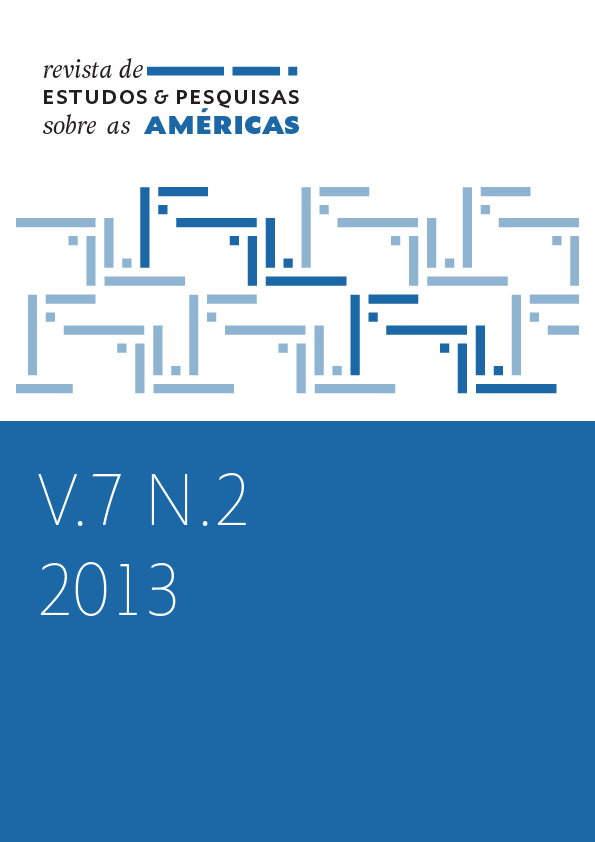CUBAN COMMUNISTS AND STRUGGLES FOR POWER IN THE 50s
Keywords:
Political power. Nationalism. Communism. Armed struggle.Abstract
The Cuban Popular Socialist Party (communist) in the early 1950s adopted a policy of democratic front and open elections, supporting the Partido del Pueblo Cubano (Orthodox), a nationalist party with ample sympathies. However, in March 1952, a representative of the oligarchy, Fulgencio Batista, conducted a military coup and the situation changed. The following year, a group of young people led by Fidel Castro begin the armed struggle. The PSP did not understand this polical line and criticized it. This paper tries to explain the party's stance with respect to the political power at this period and the reasons why it could not lead the 50s revolution.
Downloads
References
DARUSHENKOV, Oleg. Cuba, el camino de la Revolución. Moscú,
Progreso,1978.
DÃAZ, A. Informe del Pleno del Comité Nacional del PSP, mayo de 1957.
DÃAZ, A. Sobre la situación actual y la táctica del partido, 1957
GÁLVEZ, William. Camilo, Señor de la Vanguardia, La Habana, Editorial de
Ciencias Sociales, 1979.
IGLESIAS LEIVA, Joel. De la Sierra Maestra al Escambray, La Habana, Editorial
Letras Cubanas, 1979
LENIN, Vladimir Ilich. El Estado y la Revolución. Segunda reimpresión. Grupo de
traductores de la Fundación Federico Engels. Madrid, Fundación Federico Engels,
Tomado de: www.fundacionfedericoengels.org/images/stories/PDF/02_
lenin_estado_revolucion.pdf.
LENIN, Vladimir Ilich. La enfermedad infantil del “izquierdismo” en el
Comunismo. 4ta impresión. Pekin, Ediciones en Lenguas extranjeras, 1975.
Tomado de: juventud.psuv.org.ve/.../la-enfermedad-infantil-del-izquierdismolenin.
LÖWY, Michael. O Marxismo na América Latina. Uma antología de 1909 aos
días atuais. 1ra edición, Sao Paulo, Editora Fundación Perseu Abramo, 1999.
MARTÃNEZ HEREDIA, Fernando. “Revolución cubana contra los colonialismos
y necesidad de Fanon”. Cubadebate, 25 de agosto de 2012. Tomado de: http://
www.cubadebate.cu/opinion/2012/08/25/revolucion-cubana-contra-loscolonialismos-
y-necesidad-de-fanon/”, consultado 23-08-2013.
MASSÓN SENA, Caridad. En los márgenes de la memoria (Conversado con Edith
García Buchaca). Inédito, 2006)
PSP. “Bases para un arreglo limpio de la situación cubana”, Carta Semanal, No 6,
de septiembre de 1953.
PSP. “¿Cómo detuvieron a los compañeros Cabrera, Antonio Pérez y otros. Carta
Semanal, No 2, 15 de agosto de 1953.
PSP. “12 de Agosto (Un Ejemplo a Seguir)”. Carta Semanal, Época II, n. 156, p. 1, 8
de agosto de 1956.
PSP. “El camino”. Carta Semanal, n. 4, p. 2, 3 de septiembre de 1953.
PSP. “El camino del pueblo: agosto de 1933. Manifiesto del PSP”. Carta Semanal,
Época II, n. 165, p. 1,10 de octubre de 1956.
PSP. “El juicio de Santiago”. Carta Semanal, n. 7, p.2, 26 de septiembre de 1953.
PSP. “Llamamiento de la Mesa Ejecutiva”. Fundamentos, n. 129, p. 104,
noviembre de 1952.
PSP. “Los acontecimientos de la semana pasada y lo que debemos hacer ahora”,
Carta Semanal, Época II, No 245, 23 de abril de 1958.
PSP. “¿Por qué nuestro Partido apoya a la Sierra Maestra?”, Carta Semanal, Época
II, No 239, 12 de marzo de 1958.
Downloads
Published
How to Cite
Issue
Section
License
The published material is the property of the Journal, and may be reproduced in whole or in part with indication of the source.
Copyright: Authors will be responsible for obtaining the copyright of the material used. Authors who publish in this journal agree to the following terms:
a)Authors retain the copyright and grant the journal the right of first publication, with the work simultaneously licensed under
the Creative Commons Attribution License which allows the sharing of work with acknowledgment of authorship and initial publication in this journal.
b) Authors are authorized to take additional contracts separately, for non-exclusive distribution of the version of the work published in this journal (eg, publish in institutional repository or as a book chapter), with acknowledgment of authorship and initial publication in this journal.
c) Authors are allowed and encouraged to publish and distribute their work online (eg in institutional repositories or on their personal page) at any point before or during the editorial process, as this can generate productive changes as well as increase the impact and the citation of the published work (See The Effect of Free Access).
















